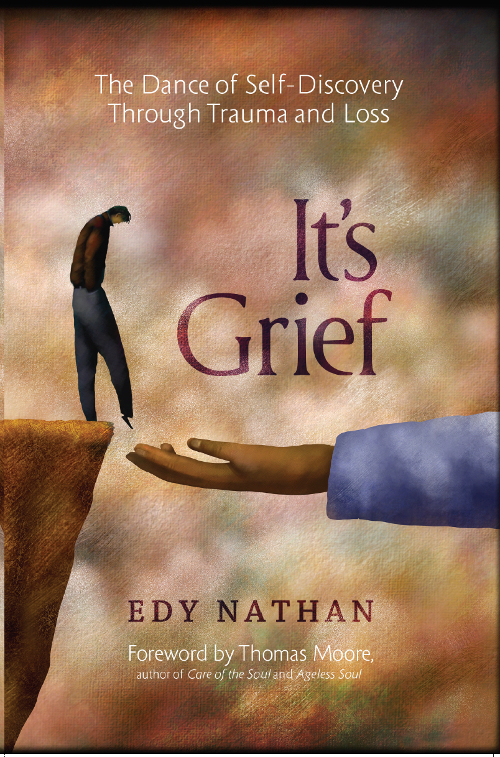The following is excerpted with permission from It’s Grief: The Dance of Self-Discovery Through Trauma and Loss by Edy Nathan ($24.95, As I Am Press, 2018)
 As a powerful survival instinct, anger is integral to defending your inner core. We use anger to fight for boundaries and to communicate abject fears. These are the necessary and healthy aspects of anger. When feeling threatened or scared, you have probably used anger to defend yourself or to be heard.
As a powerful survival instinct, anger is integral to defending your inner core. We use anger to fight for boundaries and to communicate abject fears. These are the necessary and healthy aspects of anger. When feeling threatened or scared, you have probably used anger to defend yourself or to be heard.
In the mourning process, anger is one of the emotions that moves in and out like the tide. Sometimes it envelops you like a flood, and if you respect its power, you can learn more about how and why it operates.
Instead of avoiding it or letting it mold you, you want to tap into the ability to converse with its core: Identify what fuels it and gain insight into what quiets it.
Respect Your Anger
Respect anger’s capacity to help you heal, while also understanding how anger can contribute to losing your sense of self. The experience of being lost in anger can feel like emotional whiplash. It can surprise you and rise within the body without caution or warning. The rawness of your anger filters into your life with a sense of chaos and emotional states of disarray. It can be frightening to be consumed by this seemingly destructive emotion. Naturally, you desire to disengage from its clutches. Do you ever wonder what would happen if you weren’t afraid of anger? If you actually allowed full engagement with it, what do you imagine would happen within your psyche?
Anger is one of the phases of grief. In this phase, two distinct impulses surge within you. The first impulse is to externalize the anger by lashing out aggressively to show others how you feel (and almost forcing them to feel it with you). The second is to internalize the anger by attempting to keep it hidden. The fear of letting the anger out may occur because you believe that once out, it cannot be concealed or controlled. You would be exposing a part of you that is volatile, explosive, and perhaps unmanageable.
Either internalized or externalized anger will result in the same sense of drowning and emotional deregulation, which can leave you feeling unstable. Whether you act out your anger through aggressive acts, or try to hide your anger, neither option resolves your emotional response. If the soul is not allowed to tangle with anger as part of the mourning process and anger is not given the reverence it deserves, this unresolved, internalized anger will erupt into rage, and despair will surely follow. When this happens, the abundant internal chaos takes up space and doesn’t want to leave.
Anthony's Story
Anthony is a 42-year-old man who shared his thoughts on the anger he experienced while facing his adoption:
I have never reacted with the degree of anger I have in my bones right now. My throat is tight, I am in a blind rage, and if I were an animal I would want to bite off someone’s head. Some of it is not rational, I know this, yet some of it makes perfect sense to me. Once I’m in the cycle, it’s a place of no return. My jaw is clenched, my nerves are activated, and I am just plain mad, mad, mad at everything! Frankly, I’m exhausted from being so angry. This is not who I used to be. I wish my birth mom had not given me up for adoption and then tried to contact me.
Though the scenario of adoption may not be part of your experience, does the degree of rage resonate with you? Is it possible that Anthony is more afraid than angry, yet anger is the emotion he is connecting with and expressing?
Stay Connected
One way to disconnect from this type of raging is to delve into the initial experience of your anger; especially if no one has taught you that anger is allowed. When you experience anger, often the first instinct is to hide it or shield yourself from it. However, this particular dance requires going into the depths of the soul so you can become aware of other emotions that serve as feeders to the anger in your grief. Fear of the unknown can lead to despair and may be a feeder to rage. Rage can be easier to express than fear.
Anger is on the opposite end of the spectrum from anxiety. When you are overcome by anxiety, if you think about and engage with your anger you may find that the anxiety disappears. Understanding anger as a tool for anxiety relief is critical to exploring any resistance you may have to expressing your anger.
The Release
Your initiation into this part of the dance is discovering that what has angered you is directly related to the sense of helplessness you may be feeling. In any loss, the lack of power to change what you’ve lost, how you were traumatized, or how you could have reacted differently is directly related to a sense of despair. It can be helpful to write in your journal/notebook as you begin to examine what may be feeding your anger by exploring what fears or anxiety have left you immobilized and feeling ineffective.
No one likes to experience powerlessness. Once the anger is recognized and established, anxiety will often dissipate, and the anger finally comes out of hiding.


